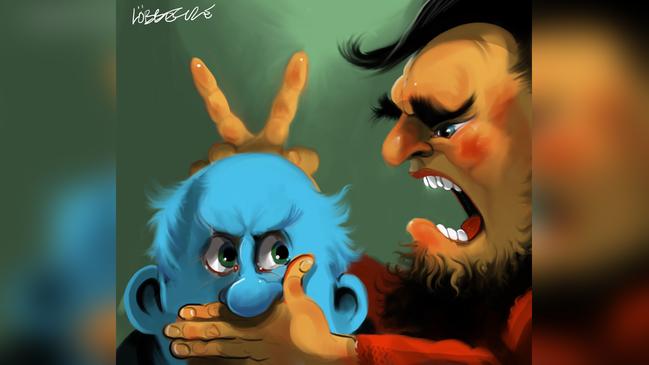PC brigade in a hate speech class of their own

The politically correct class in Australia has always been particularly zealous in its defence of provisions such as section 18C of the federal Racial Discrimination Act and similar provisions in the anti-discrimination laws of the states and territories.
These statutes make it unlawful to publish material that, in many cases, does no more than offend the sensibilities of various groups in the community. What these laws do is place a higher value on hurt feelings than on the rigorous public debate of political, social and economic questions.
It is under one of those laws that the Nine Network and Sonia Kruger face legal proceedings, starting tomorrow, alleging racial vilification. In a morning TV show, Kruger attempted to discuss the question of whether there was any correlation between Muslim immigration and terrorist incidents in various countries.
When it comes to its own participation in public debate, however, the politically correct class often has few limits on offensive and insulting statements.
When two members of the Senate proposed the amendment of section 18C in 2016, they were described by the chief political correspondent of The Sydney Morning Herald as “hate-speech apologists”. In addition one was said to be “a boorish, supercilious know-all with the empathy of a Besser block” and the other “an absurdist fringe-dweller”. Both were “self-promoting misanthropes”.
About the same time, in a Herald cartoon of Malcolm Turnbull speaking at the UN about refugees, he was shown as wearing three badges inscribed with: “Hate makes the world go around”, “Hate will find a way”, and “All you need is hate”.
One of the most flamboyant examples of this sort of rhetoric occurred last March when Julian Burnside posted on Twitter an image of the federal Minister for Home Affairs, Peter Dutton, in a Nazi uniform. This was a particularly striking example because Burnside is not from the fringes of Australian society. He is the product of Melbourne’s most prestigious private school, a Queen’s Counsel at the Victorian Bar and a member of the Order of Australia.
It would have been unthinkable in the fairly recent past that such an establishment figure would be involved in these kinds of guttersnipe exchanges, but the tenor of public debate in Australia has certainly changed in a relatively short space of time.
More recently there were the comments of a history professor at Sydney University who asked whether The Australian’s Greg Sheridan and Chris Kenny “think that Western countries are succumbing to a poisonous cocktail of multiculturalism, Muslim immigration, political correctness and cultural Marxism”, and added: “It seems that, much like Anders Breivik and Steve Bannon, they do.” Putting aside this categorisation of former Trump staffer Bannon, Breivik was the person who murdered 77 people on one day in Norway in July 2011. This material was published in, of all places, the ABC’s religion and ethics website, but the reference to Breivik was later removed by the ABC. The professor said: “I think some people have overreached themselves with their incendiary rhetoric.” Quite so.
Sydney University staff have no monopoly on inflammatory statements. An edition of the student newspaper in May carried a photo on the cover of a female suicide bomber who had killed many Israelis, describing her as a “martyr” in the struggle against “Israeli colonisation”.
When the Australian Union of Jewish Students complained, the student representative council passed a motion condemning them and congratulating those who had worked on the newspaper “for their brave and highly defensible cover depicting a pro-Palestine freedom fighter”.
The domination of universities in Australia by the politically correct class is, of course, not a recent phenomenon. But their influence is just as pervasive in most public institutions and many private ones, including the boards of many public companies, often seemingly more concerned with taking a political stance than making a profit for their shareholders.
What is interesting, however, is the contrast between this group’s view of themselves as the moral guardians of society and their ferocious intolerance for anyone who expresses a view contrary to their own. It is as if those contrary views represent a threat to their role as moral guardians, whereas they occupy most of the commanding heights of Australian society and are, unfortunately, not at all threatened.
One thing they have done, however, is to lower the tone of public debate with virulent attacks on their opponents that reflect the deep intensity of their sanctimonious opinions.
Michael Sexton is the author of several books on Australian history and politics.


